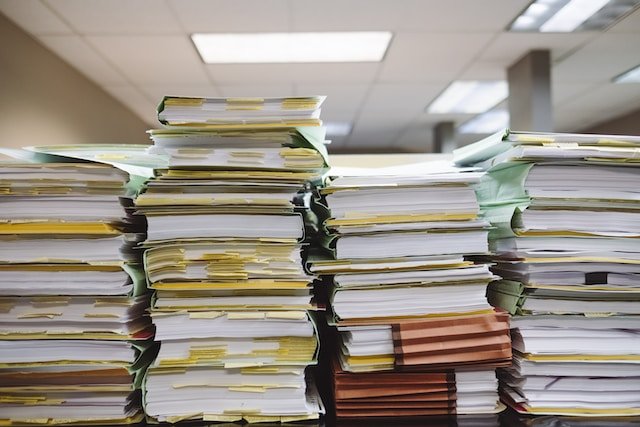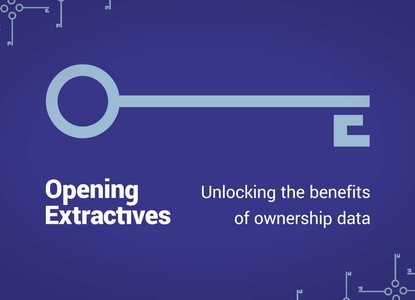Top four trends: what we’ve learnt from supporting journalists and civil society activists to use beneficial ownership data

Photo by henry perks on Unsplash
A few years ago, Open Ownership decided to dedicate more time and resources to engaging with the people interested in using beneficial ownership data, including investigative journalists and civil society actors. They can play a key role in preventing and detecting corruption, promoting good governance, and demanding accountability from those in positions of power. Since then, we have been working to better understand their interests, how they are (or could be) using publicly available data, and how to support them in doing so.
Through our Opening Extractives (OE) programme, jointly implemented with the Extractive Industries Transparency Initiative (EITI), we have trained investigative journalists and civil society actors to help them understand how simple and complex ownership structures operate transnationally. We have also been providing funding and technical support to help them write investigative articles and develop research and campaigning projects.
As part of this engagement, professionals across the globe have been analysing data from public registers, and combining them with other official and non-official sources to investigate a variety of cases. From exploring fishing practices in Ghana, to ownership of extractive companies in Argentina, Nigeria and Zambia, and mining contracts in Mongolia, this engagement has produced interesting stories that will come to light during the coming months.
This blogpost outlines the trends we have observed through this work.
Common trends in using beneficial ownership data
1. Beneficial ownership (BO) transparency can help achieve a wide variety of policy goals
As soon as we started offering financial and technical support to civil society and media actors via the OE programme, we received hundreds of proposals for projects. People wanted to better understand what exactly beneficial ownership is, where to find information, and how to analyse it for investigative projects. This signals how relevant it is to pay attention to data users’ needs if we are to ensure that beneficial ownership reforms can translate into action. Through the proposed projects, and those we supported, we learnt about the many different ways in which ownership data can be used to help address local and national issues. For the citizens we have supported, this data has been crucial in trying to find out who should be accountable for:
- Companies extracting natural resources without an extractive licence;
- Poor living conditions of communities living in natural resource extraction areas;
- Foreign companies disguising ownership to bypass legal restrictions to fish in other countries’ waters;
- Companies not paying mining royalties, thereby creating a large loss of national income;
- Large-scale mining licences being awarded to sanctioned individuals;
- A limited number of multinationals controlling the majority of companies extracting natural resources crucial for the energy transition;
- Officials suspected of using their influence to grant public contracts to pre-selected companies in which they may have an interest; and
- Lack of sanctions placed on officials of a government-owned corporation following their involvement in opaque oil contracts that led to domestic revenue loss.

Photo by Wesley Tingey on Unsplash
2. Data can be hard to find, as many companies don’t submit their beneficial ownership declarations or the data is not accessible
Last year the OE programme supported four Ghanian researchers who used Ghana’s publicly available data on beneficial ownership and mining licences to investigate existing processes to award mining licences and carry out due diligence on mining companies’ service providers. The researchers found themselves in a dead end, as almost 80% of their searches couldn’t be completed due to lack of submissions by companies, or the existence of incomplete or false fillings. As well as previous projects supported by OE, this has also been the case for some of the current projects the OE programme is supporting. Lack of compliance with beneficial ownership regulations is not new: only around a third of companies in Zambia and Indonesia and some 10% of companies in Nigeria have submitted the ownership information required by the law.
We have also been supporting data users in places where ownership data is only accessible to designated authorities, like in Mongolia, the Philippines or Senegal. While more time has been invested there to build awareness and advocate for greater beneficial ownership transparency, journalists and citizens have been trying hard to find alternative ways to seek out information, but facing even bigger challenges to carry out effective investigations.
Whether due to a lack of company compliance with existing regulations, or a lack of rights to access the data, this means journalists need more time to investigate certain cases. It is resource-intensive to seek out the required data by contacting the companies directly, searching for alternative sources of information such as company websites and annual reports, or trying to visit an authority in person to access non-digitised documents.
Allowing people to easily access and analyse beneficial ownership data in central registries can not only be a key source of information for investigations or projects, but also inform governments’ reform. It can generate detailed feedback that can help them improve regulations, chase companies that have not fulfilled their obligations, and even sanction them.
3. Successful investigations require cross-matching between various national and international sources
It is widely known that corrupt individuals and criminals use companies and other legal vehicles registered in different jurisdictions to create complex ownership structures with multiple layers to obscure their activities and true owners. Therefore, in addition to a lack of domestic compliance, comes the challenge of combining national and international data sources to reconstruct companies operations and ownership chains scattered all around the world.
The three main things we have learnt about this from our work with data users are:
- Frequently, domestically-registered companies are subsidiaries of other companies operating in different countries. Identifying which is the controlling company, where it is registered, whether this jurisdiction has company ownership data publicly available, and what the regulations are in that jurisdiction, is a first step for investigations. But even when these key things are identified, when continuing to look further up in the ownership chain, companies (or other controlling corporate vehicles such as trusts) can be registered in secrecy jurisdictions where no data is published. This makes it easier for the corrupt to hide assets, and harder for investigators to uncover them.
- When there is some kind of data available, it is contained in documents and websites which are often in different languages (or even different scripts or alphabets!), or there might be a paywall to access information. There is a need for data users to have allies in the relevant countries to help support their investigations, and to have the resources to pay for the registration, access fees and documentation required. For example, proving legitimate interest for those looking for information in the European Union, currently under discussion by the European Parliament.
- Finally, finding information beyond just beneficial ownership declarations is crucial for building the big picture and contextualising the information. Not all the information needed to prove a case or find all the pieces of the puzzle can be found in beneficial ownership data. Combining ownership data with other sources such as asset declarations, political parties and campaigns financing, audit reports, company financial statements, procurement data, sanctioned lists, and so on, is key. Although all this data might not be widely available and relies heavily on each jurisdiction's idiosyncrasies, using this approach is essential to developing a strong analysis, confirming any initial hypotheses and finding new potential hypotheses to build a story.
4. Data users should be prepared to understand complex documents to carry out effective investigations
Companies’ lengthy annual reports, detailed accounting information and complex financial statements contain valuable information that can provide key data for understanding the company’s structure and its beneficial owners, particularly when dealing with listed companies. Knowing who profits from annual incomes or dividends can provide useful data to identify the company’s beneficial owners, or even complement the analysis by knowing whether the company has been sanctioned or paid a fine. Sectoral reports such as national extractive industry reports, associated licensing processes, tax requirements or legal regulations can also be difficult to navigate, but can be a key part of the puzzle. However, these are not only complex and long, but sometimes hidden in websites or only accessible via following a hyperlink trail.
Our work to support investigations
We are committed to supporting people and organisations that want to learn how to investigate companies and combat corruption and illicit financial flows through beneficial ownership transparency.
Open Ownership, through the OE programme, has been providing technical expertise on beneficial ownership and working with experienced investigative journalists, industry leaders and financial and business experts to help data users navigate the challenges highlighted in this blog post. For example, we recently worked with Finance Uncovered, to help journalists and data analysts taking part in Mongolia Data Club’s project to understand financial statements as part of their beneficial ownership investigation into the Mongolian mining sector. In a recent workshop in Argentina, a renowned journalist dived into stock exchanges websites and the National Values Commission to help workshop participants understand reports, board meeting minutes and other documents.
In order to address noncompliance issues, Open Ownership is also working closely with businesses registration bodies in over 15 countries to improve companies’ declaration forms and outreach activities to sensitise companies on the importance of beneficial ownership submissions and how to do so.
Our team of experts and researchers is just an email away from providing guidance, feedback and discussing angles with you to support projects or investigations in the best way we can. In addition, we regularly produce materials, tools and briefings which outline our policy positions and practical guidance to help use beneficial ownership data.
If you want to use your country’s beneficial ownership data, are using it and are struggling with something, or just want to learn more about the topic, do not hesitate to contact our Community Engagement Manager for more information about upcoming training sessions and opportunities!
Online courses of interest
- Understanding companies accounts, Finance Uncovered
- Follow the Money workshops, Finance Uncovered
- Financial investigations, Centre for Investigative Journalism
- Open Ownership’s series of online workshop on beneficial ownership data use:
- Workshop 1: The benefits and advantages of structured and interoperable beneficial ownership data
- Workshop 2: The Open Ownership Register and tools to work with its data
- Workshop 3: Visualising and telling stories with beneficial ownership data
Related articles and publications
Publication type
Blog post
Topics
Opening Extractives

